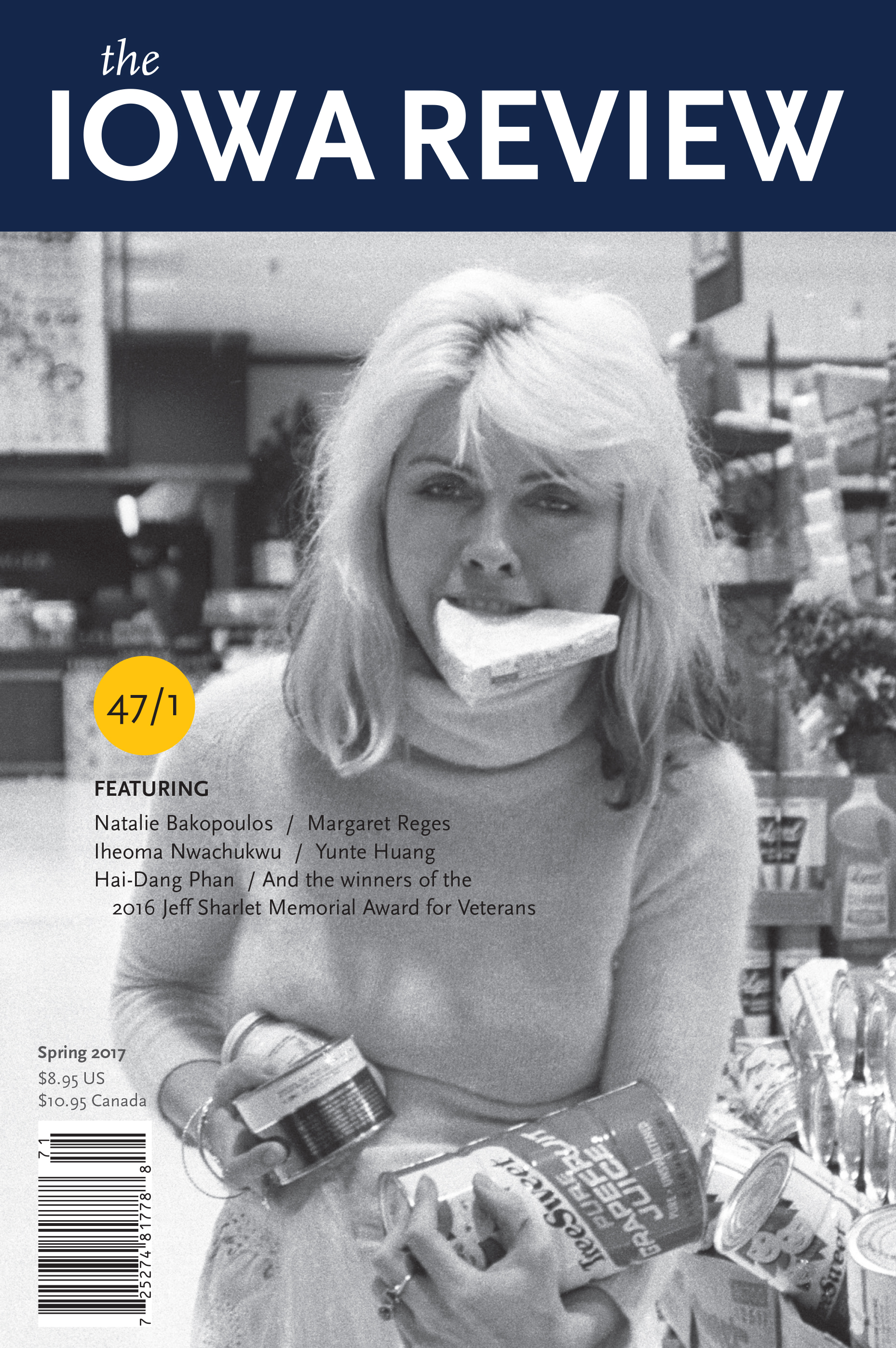
We arrive fighting. Our father says he can’t loan us any more money; our sister says it’s time. Our husband drags us from the car and through a haze of carbon monoxide smoke. Our girlfriend cuts us down. Our landlord says we can’t flood the bathtub, pull the fire alarm, or jump out of the bushes—we’re scaring the other tenants. The state trooper pulls us over. Driving like this is against the law. So is panhandling in the skyway. So is baptizing your children in the Mississippi. The barista says we can’t take up a table; the librarian orders us out of the stacks. We apologize. We didn’t realize we were talking to ourselves. Our roommate turns us on our side. Our neighbor wakes us from a nap in the snow. Our friends won’t invite us for dinner, or let us crash on their couch—not when we’re like this. We lean over the rail of the Washington Avenue Bridge, mesmerized by the drop.
They take us to the county psychiatric ward. The doors are thick and made of metal and lock behind us automatically. We’re told it’s okay to eat; the food isn’t poisoned. Neither is the water. Still, we only ingest things that come in sealed packages: saltines, peanut butter, apple juice with a foil cover. Our hold papers are delivered with a doctor’s signature testifying we’re a danger to ourselves or someone else. They confiscate our shoes, razor, perfume. They cut the string from our hoodie. We look, but there’s nothing sharp to be found. The bathroom mirror is polished metal, our reflection dusky and warped. We’re put to bed on a narrow cot.
There are tests. Blood. Urine. The Beck Depression Inventory. The Millon. Neuropsych testing. Rorschach blots. It’s a baby. A man. An elephant. It’s a clone. It’s a clone. That one, too, it’s a clone. We take the MMPI, all 567 questions. Do you like mechanics magazines? Are you easily awakened by noise? Do you sometimes feel like there’s a tight band wrapped around your head? Was your father a good man? Do you feel like smashing things? True false, true false, true true, false. We color the bubbles in a pattern: Frankenstein’s face with a diagonal scar. Here you go, doc.
It’s night. We’re awake. Every surface is fascinating and requires cleaning. When we ask the night nurse for a bucket and mop, he says absolutely not. He knows us from the last time, is weary of our face. We alphabetize the measly library of romance and science fiction, water the half-dead plant, dump out all the jigsaw puzzles and try to put them back together. We consult with our reflection in the window, talk to our slipper like it’s a phone. There’s a loose screw in our window, sharp enough to etch a pattern in our thigh. The pain of it begins in our heart and surges through our limbs, until we’re released back into our body.
We’re so tired in the morning. The therapeutic recreation staff stands in our door, insisting we go to occupational therapy and make a bracelet, as if this could save us. The bracelet is made of plastic beads. We give it to our psychiatrist, but he still won’t let us have a pass, not for a day or an hour or even five minutes, just long enough to breathe the smells of exhaust and fried food and hear the rush of the commuter train.
We find other ways to remove ourselves. We ask for pills and toss them back like Tic Tacs. The benzos are the best. We sit beside the dying plant and wait for them to kick in. We drink decaffeinated coffee, chew nicotine gum, eat powdery graham crackers. When there’s nothing left to put in our mouths there’s always television: evangelists in the morning, Judge Judy in the afternoon. Someone wants to watch the Golden Girls marathon, and we’re too depressed to argue. Our days have a laugh track now.
We go to group therapy and state our goals. We want to earn a day pass. We want to stop punching things. We want to see our baby daughter who was taken by the state, even if it’s only for a few hours. We want getting out of bed in the morning to be easy. We want to call our families and make amends. We want to win the lottery and use the money to take all of our friends on an around-the-world trip that begins in Rio and ends in Bombay. All of us want to go home. The mean nurse says to keep it realistic. We revise our goal. We’ll comb our hair. The nurse makes a check on her clipboard.
Our roommate is always crazier than us. He walks in slow circles, wrapped in white sheets. She wears dark sunglasses, even to bed. He washes his hands until they’re raw, talks to his teddy bear, hoards grape jelly and toothpaste. She clogs the toilet with tampons, smokes cigarettes in the bathroom, tells the mean nurse it was us. We take the blame. Our loyalties are to each other. We eat our meals together—boiled noodles and limp salads. We play Monopoly and Go Fish, become friends, sometimes lovers. We form pairs, then groups, making selections until our original families are replaced.
We keep the most important things to ourselves: the chip in our sacrum, the rabbit in our belly. The machine in our basement that can do anything, including water purification and time travel. We don’t mention our journey through the supercollider and the way molecules have been disintegrating around us ever since. We can handle it. We’ve recently learned to control our involuntary organs. Our thoughts are broadcast on the Internet; the TV tells us what to do. We deny the voices, deny the little people marching out of the ground. So eerie and stunning, the way they just keep coming—tiny arms swinging, heads snapping to the side as they grin. Before we can help it we’re laughing, and our psychiatrist wants to know why. His question makes them scatter. Recognition crosses his face, and we remember what we are.
The nurses come with pills in tiny paper cups. Risperdal. Haldol. Clozaril. Zoloft. They make our heads light, our mouths dry. Our sweat smells sharper as we’re modified from the brain out. If we refuse the pills, they give us shots. It’s easier not to fight. We agree to take the lithium, and they draw our blood to see if the right amount is trickling through our veins. The Depakote comes in packets. We choke down the gray bullets in a fistful. The Thorazine makes us stiff; the Zyprexa makes us fat. All of them make us tired. The mean nurse says we’re not allowed to nap in the lounge. Our psychiatrist says things are going according to plan.
The nice nurse gives us our first dose of Paxil. It sits in our palm—tiny, white, glaring. She asks if we’d like to know how it works, and we say okay. She draws a picture of baseball bats. These are brain cells. She draws bubbles—serotonin. It’s a chemical that makes people feel good. Usually serotonin gets sucked up by the baseball bats, but Paxil stops that from happening. She draws an X, blocking the bubble’s entrance and sending the serotonin floating between the spaces. She draws sparkles with her flashlight pen. These sparkles could make us happy. We take the pill.
We’re granted privileges to go on therapeutic outings. We file onto a big yellow bus and go mini-golfing, to the shopping mall, to a suburb to see the holiday lights. We walk through a Christmas maze. It’s a stampede of healthy white people, moms and babies and giant strollers, with elves leading the way. There’s a manger with a pony. Our roommate tells us the pony is possessed. He says to the pony, “Be gone, be gone!” But we know the pony is just a pony. He stamps his hooves, breathing clouds into the night. We stamp our own feet, the energy of the ground rising up into our legs, genitals, armpits. Our lungs generate vapors that mix with the pony vapors, and all the questions about our inherent self-worth are driven from our head by the odors of manure, hay, and the tang of pony musk. We place our cheek against his neck, which jerks in surprise, and then calms. The pony isn’t ashamed of the markings scattered across his back like turds, or worried his eyes are bulbous and lopsided. He only knows he can see in all directions.
We change the linen on our bed for the first time since we got here. We shower twice in one day, floss for the first time in years, tell the mean nurse to take care of the fucking plant himself. We go to the therapeutic recreation party and sing Patsy Cline, even though we can’t sing and don’t know the words. We go to the gym and lift weights until our only outfit clings to us like a second skin. We call our sister in Phoenix, the one we haven’t spoken to in years. We want to tell her off but end up crying at the sound of her voice. We go to grooming group and paint each fingernail a different color, and do our roommate’s nails, too. We cut off all our hair. Don’t mind us. We’re going through some things.
One morning, getting out of bed is easy. The night nurse makes the first pot of coffee at dawn. The common room glows. We sit by the east window, gazing at memorized tree branches etched in snow. The psychiatrist has written us a pass, a trial to see if we’re ready. Maybe we’re not. Maybe we are. Both possibilities terrify us. Our roommate sits down. Below us, rush hour has begun. Cars run the yellow light; bikers race the train. The pedestrians move toward their destinations. Our roommate stands and bangs on the window. Most people don’t look up. The ones who do see only sunlight on a building.
